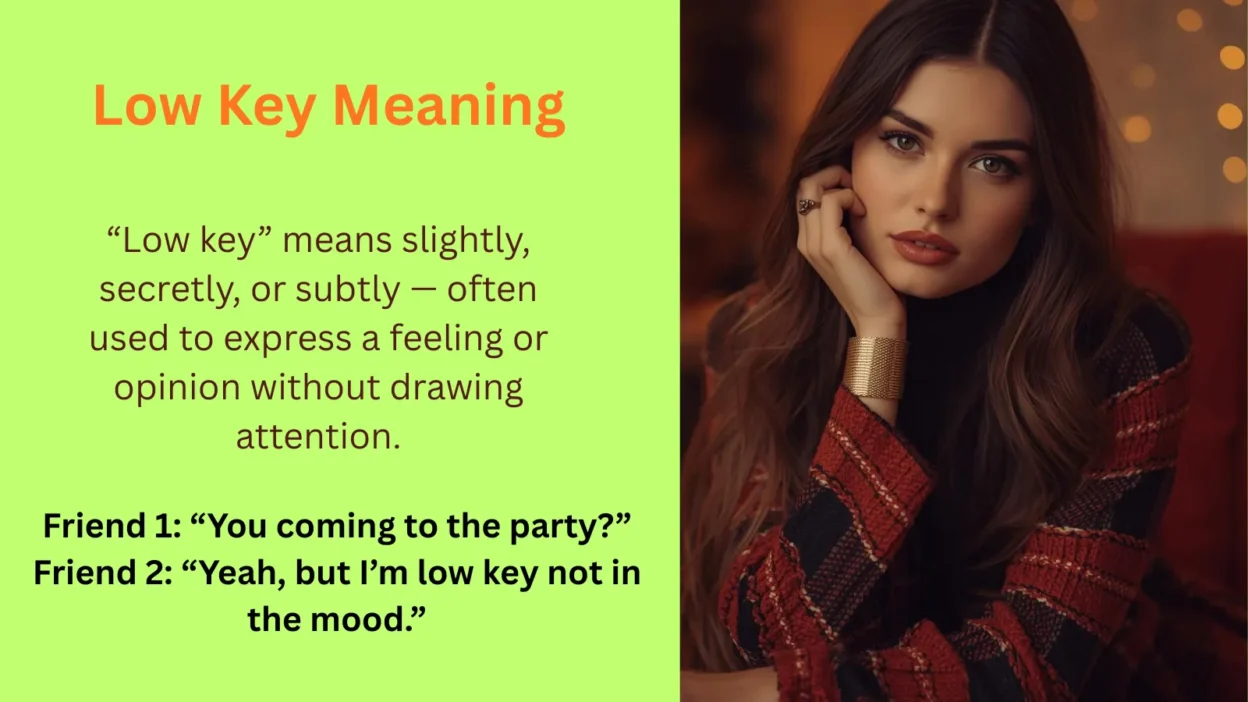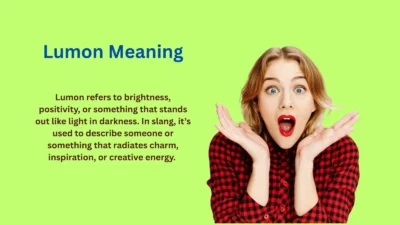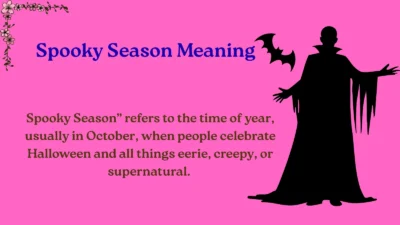Ever wondered about the real low key meaning and how people use it in everyday conversations?” The phrase “low key” shows up everywhere — in texts, TikToks, tweets, and everyday talk. You might hear someone say, “I low-key love this song” or “I’m low-key tired.”
Originally, low-key meant restrained or not intense, but online it’s evolved to describe something slightly true, secretly felt, or done quietly without making a big deal about it. Whether you’re sharing a mild opinion, soft confession, or low-effort mood, using “low key” makes your message feel casual and real.
In this guide, we’ll break down the low-key meaning in slang, show examples from real conversations.
What Does Low Key Mean in Slang?
Low key means slightly, secretly, or subtly — often used to express a feeling or opinion without drawing attention.
It’s a way to say something is true, but not too loud about it.
Examples in Conversation:
- Friend 1: “You coming to the party?”
Friend 2: “Yeah, but I’m low-key not in the mood.” - “I low-key miss summer already.”
- “She’s low-key the funniest person in the group.”
In these examples, “low key” softens what you’re saying, making it sound honest yet relaxed. It’s often used humorously or playfully online to share real feelings without sounding too serious
Background & History
The term “low key” originally comes from music, where it described soft or gentle tones. It referred to songs that were calm, not loud or dramatic. By the mid-1900s, people began using it metaphorically to describe events or personalities that were relaxed, modest, or under the radar.
With the rise of social media and texting, “low key” evolved into a slang term for subtle emotion or secrecy. It became popular among younger generations who wanted to express feelings indirectly—showing emotion without oversharing.
By the 2010s, “low key” became one of the most popular slang expressions online. Platforms like Twitter, TikTok, and Reddit spread it quickly. Today, it’s common in both Gen Z and millennial vocabulary, symbolizing chillness, honesty, and emotional balance.
Usage in Various Contexts
“Low key” fits many situations, depending on tone and setting.
1. Texting and Social Media
People use “low key” to express emotions quietly or admit things indirectly.
Example:
- A: “Did you like the party?”
- B: “Low key, yeah. It was better than I thought.”
2. Gaming
In gaming chats, “low key” means doing something quietly or without drawing attention.
Example:
- “Let’s low-key attack from the left so they don’t see us.”
3. Daily Conversations
It’s often used to describe mood or preference.
Example:
- “I’m low-key stressed about tomorrow’s test.”
- “Let’s keep the hangout low-key—just a few friends.”
4. Professional Settings
Used carefully, it can describe subtle plans or emotions.
Example:
- “We’re low-key testing this strategy before launching it fully.”
Common Misconceptions & Clarifications
Many people misunderstand “low key” as meaning boring or uninterested, but that’s not true. It actually means subtle, quiet, or private—not dull.
1: “Low key” = lazy or emotionless.
Reality: It means calm or discreet, not careless.
2: It’s only for young people.
Reality: It’s widely used across all age groups online.
3:It’s negative.
Reality: It can express positive feelings too—like “I’m low-key proud of myself.”
It’s also not offensive; however, tone matters. Using it too much in formal settings can sound casual or unprofessional.
Similar Terms & Alternatives
Here are some words and phrases that share similar meanings to “low key”:
| Term | Meaning | Example |
| Subtle | Slight or not obvious | “Her humor is subtle.” |
| Chill | Relaxed, calm | “Let’s keep it chill.” |
| Downplayed | Made less noticeable | “They downplayed the win.” |
| Discreet | Private or hidden | “He kept it discreet.” |
| Under the radar | Not easily noticed | “We’re planning this under the radar.” |
All these terms can replace “low key” depending on the tone and context.
How to Respond to This Term
You can reply to “low key” in many ways based on the situation:
1. Casual Response
A: “I’m low-key excited for the trip.”
B: “Same, it’s gonna be fun but chill.”
2. Funny Response
A: “I low-key want pizza right now.”
B: “High key same, let’s order!”
3. Professional Response
A: “We’re low-key testing this feature.”
B: “Got it. Let’s keep it confidential for now.”
4. Privacy-Conscious Response
A: “I’m low-key dating someone.”
B: “Don’t worry, your secret’s safe with me.”
Regional or Cultural Differences
“Low key” is most common in American, British, and Australian English, but it’s now recognized worldwide thanks to social media.
In Japan, people might say “quietly” or “secretly” to express similar tones. In Spanish-speaking countries, phrases like “en silencio” or “discretamente” carry the same idea.
While the slang form “low key” is mainly English-based, global users often blend it into their own language when texting or tweeting—especially among younger crowds.
Comparison with Similar Terms
| Expression | Meaning | Level of Emotion | Example |
| Low key | Subtle, slightly | Mild | “I’m low key tired.” |
| High key | Strong, openly | High | “I high key love this song.” |
| Chill | Relaxed | Neutral | “Let’s have a chill night.” |
| On the down low | Secret, private | Private | “Keep this on the down low.” |
“Low key” sits between emotional honesty and subtlety—it’s not loud but not hidden either.
Usage in Online Communities & Dating Apps
On platforms like Twitter, TikTok, Reddit, and Tinder, “low key” adds humor and honesty to posts or profiles.
Examples:
- Twitter: “Low key think I should quit my job and travel.”
- Tinder Bio: “Low key looking for something real.”
- Reddit: “Low key addicted to this game.”
In dating apps, “low key” signals openness while still sounding casual. It’s flirty but not too forward.
Hidden or Offensive Meanings
“Low key” doesn’t carry offensive meanings, but tone can affect interpretation. Saying “low-key hate you” might sound playful or mean, depending on delivery.
In sensitive contexts, such as workplaces or online debates, it’s better to clarify your intent to avoid misunderstanding.
Suitability for Professional Communication
While “low key” works well in friendly office chats, it’s not ideal for formal writing. Avoid it in emails, presentations, or reports unless the tone is casual or creative.
Better professional alternatives:
- Instead of “low-key testing,” say “quietly testing.”
- Instead of “low-key excited,” say “looking forward to it.”
- Instead of “low-key project,” say “discreet project.”
Using these keeps communication clear while maintaining professionalism.
FAQs:
1. What does low key mean in slang?
It means doing or feeling something subtly, quietly, or secretly.
2. Is low-key positive or negative?
It can be both—context decides. “Low key happy” is positive; “low key upset” is negative.
3. What’s the opposite of low-key?
The opposite is high key, meaning open or strong emotion.
4. Can I use low-key at work?
Yes, in casual chats. Avoid it in formal documents.
5. Is low-key only for Gen Z?
No, it’s used widely across generations online.
6. Does low-key mean secret?
Sometimes, yes. It can mean “privately” or “not public.”
7. What’s another word for low-key?
Subtle, chill, or under the radar.
Conclusion:
The slang term “low key” perfectly captures modern, understated expression — when you want to share how you feel without shouting it out loud. It blends honesty with subtlety, making it a go-to phrase for texting, tweets, and casual talk.
Whether you say “I low-key love this show” or “I’m low-key tired,” you’re letting people know your feelings in a chill, relatable way. It’s simple, expressive, and fits perfectly into today’s conversational style.
In short, being low-key is all about keeping things real but relaxed — expressing emotion without overdoing it.





